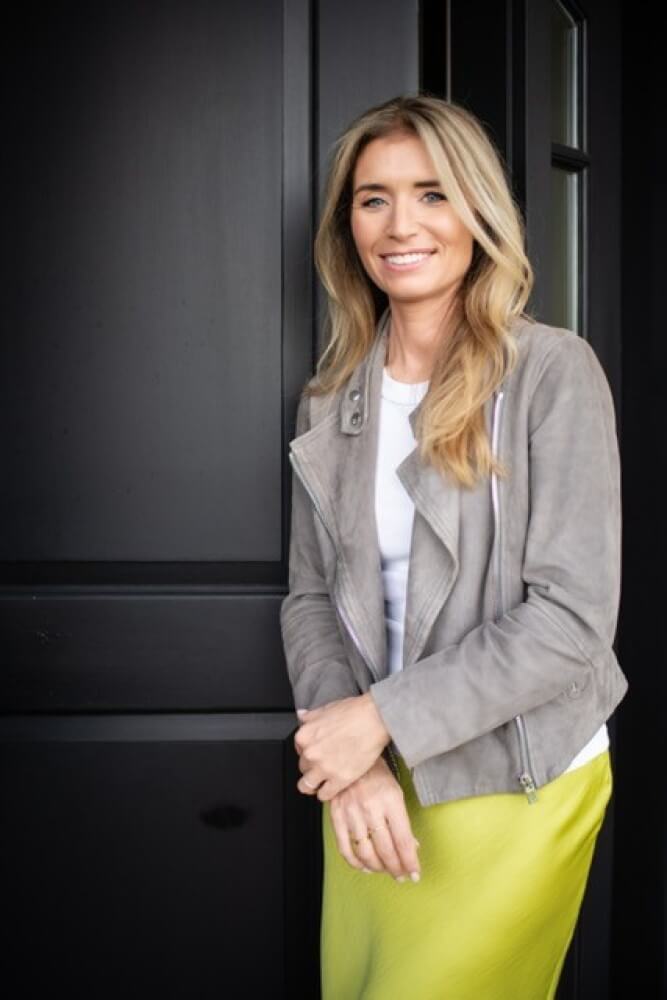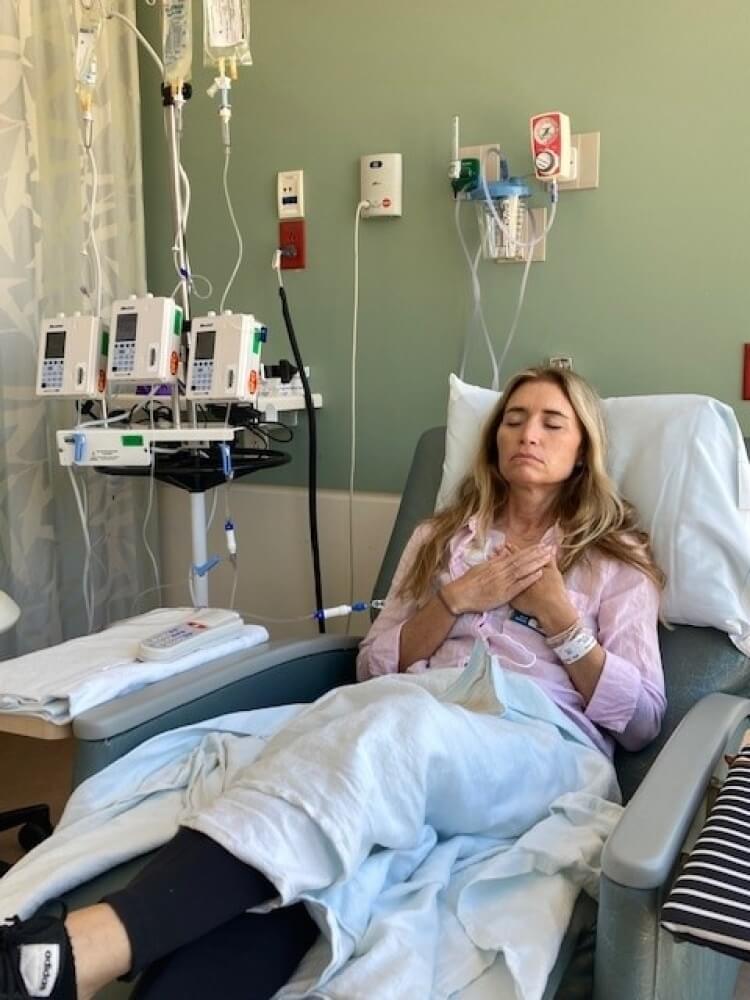Two weeks after turning 50, Wendy Tamis Robbins learned she had stage II colon cancer. Having lived with anxiety, obsessive compulsive disorder, and panic disorders nearly all her life, she used the same strategies that helped her navigate these struggles to meet her cancer diagnosis head-on.
Robbins handled the ups and downs of her summer 2022 treatment using a visualization technique in which she pictured chemotherapy infusions and their related side effects as a narrow, roaring river with large stones rising above its surface. The stones served as resting points between the infusions, with each taking her closer to the other side of the river.
When she grew uneasy thinking about the cancerous cells inside her body, and the poisonous drugs needed to kill them, Robbins looked at the willow tree outside her Marblehead home. Although it appeared unkempt and near death, she knew that the tree’s vitality would return with pruning and time. So too would her health, once the chemotherapy did its job.
Just as she did in her mental health journey, Robbins found allies beyond her supportive husband and stepchildren. Her clinical team in the Colon and Rectal Cancer Center at Dana-Farber Brigham Cancer Center, led by oncologist Nadine J. McCleary, MD, MPH, physician assistant Kathleen Boyle, PA, and social worker Holly Barron, MSW, LICSW, talked her through each anxious moment in person or by Zoom. Nobody judged her when she meditated during treatment, or cried over the phone to an on-call doctor late at night. And when Robbins felt she just couldn’t take another round of chemotherapy, McCleary assured her that it was okay — and medically safe — to do so.
“From the first meeting we had, Dr. McCleary was so in-tune with my concerns,” says Robbins. “She told me she would be at my beck and call, and she and the entire team definitely were. I was so blessed to find freedom and acceptance at Dana-Farber, along with incredible care.”

Charting a course
Growing up outside Boston, with a mother who had untreated mental health and anxiety issues, Robbins experienced her first panic attack when she was six years old. She says she adopted perfectionism and overachieving to get through the many dark moments that followed — becoming a stellar student, a collegiate javelin thrower, and a successful attorney despite multiple bouts of depression and suicidal ideation.
“I never had performance anxiety, just anxiety about not achieving,” recalls Robbins, who also struggled with disordered eating and drinking. “When I was competing, I never felt anxious.”
New health concerns came in early 2022, when Robbins had a bout of COVID, shingles, and multiple urinary tract infections. At her annual physical that spring, her primary care physician noticed her iron was severely depleted and sent her for more tests. This led to Robbins’ first colonoscopy, at age 49, and the discovery of a large cancerous tumor on her colon.
She had surgery at another hospital to remove the tumor and a large portion of her large intestine, then was told she would need six months of chemotherapy. When Robbins went to McCleary for a second opinion, however, she learned of another option.
A clinical trial led by McCleary’s colleague Jeffrey Meyerhardt, MD, MPH, co-director of the Colon and Rectal Cancer Center at Dana-Farber Brigham, had determined that for some colon cancer patients with earlier-stage disease whose tumors had been surgically removed, a three-month course of chemotherapy would not significantly affect the rate at which their cancer returned. The shorter course would also prevent harmful side effects, including nerve injury from the chemotherapy drug oxaliplatin that can sometimes cause pain, numbness, and tingling.
“Knowing I could just do three months, and not worry about those side effects, was enough in itself to make me change my care to Dana-Farber Brigham,” says Robbins. “They were also head and shoulders above in research, data, and compassion.”
This includes the way McCleary worked with Robbins to handle the challenges that came with the shorter chemotherapy regimen. In between her infusions at Dana-Farber Brigham, for instance, Robbins would take home a chemotherapy pump that she would leave attached for 48 hours and then remove herself.
“A part of the three-month therapy is something someone has to manage on their own,” explains McCleary. “I’ve had some patients that, due to anxiety, do not fully comply with this therapy despite their best intentions. We made up a plan with Wendy for each step of treatment, and I let her know there was nothing we could not talk about as often as she needed.”

Remission and reboot
Helping to execute this plan — which included Robbins’ decision to forgo the last of her six chemotherapy cycles due to the toll it had taken on her liver — were other clinicians including Boyle and Barron. All Dana-Farber Brigham patients are eligible for social work services as part of their treatment; Barron, who met with Robbins regularly, says that many people dealing with cancer experience anxiety and worry, and learning how to cope is a unique, individual process. Robbins used her already-developed coping skills such as meditation, yoga, and visualization to help do so.
“With all aspects of cancer treatment, there are existential crises that come to the surface,” explains Barron. “and even people who have never dealt with anxiety or depression can experience one or both. Wendy was able to say, ‘OK, this is happening to me. Now what’s going to help me navigate through it?’”
Even before her diagnosis, Robbins had been undergoing a transformative period. Desiring to help others with severe anxiety carve out productive, fulfilling lives, she authored a book on the subject in 2021. Then, after her treatment, she stopped practicing law to become a wellness coach, public speaker, and launch a global virtual wellness community where professional women have a safe space to get the mental health and well-being support they need, as well as support each other. She calls it the career she was always meant to have.
“Cancer was not a diagnosis, but an accelerator,” says Robbins, currently cancer-free and in a surveillance period of regular scans and check-ups. “It gave me permission to pause, reprioritize, and pivot toward my passion — empowering others who are struggling to find peace and rediscover their power and authentic voice.”
